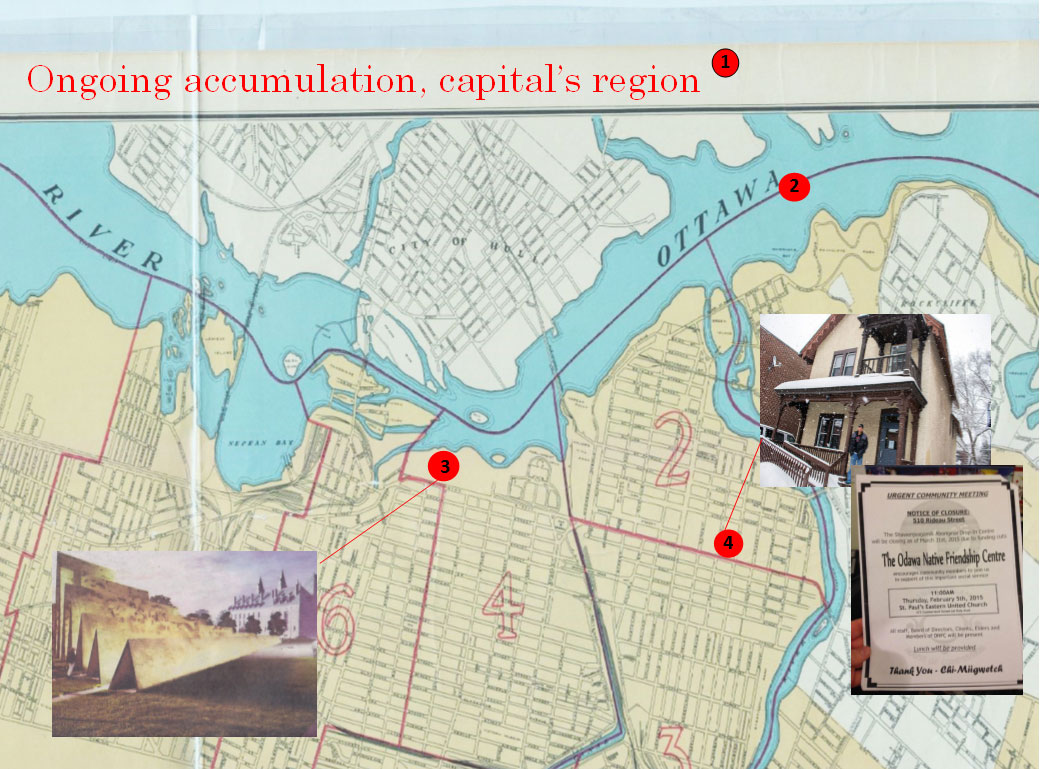- “Primitive accumulation” is Marx’s name for the enclosures that displaced and reconstituted peasant populations as landless proletariats in Europe. ‘Primitive’ meant original and past, but can be reinterpreted to point to the violent displacements and accumulations which are ongoing, especially for Indigenous peoples. Yellowknives Dene scholar, Glen Coulthard, argues the concept is valuable to the critique of settler colonialism, but only once Marx’s emphasis on social relations having to do with workers and owners is refocused on the colonial relation. Dispossession is the “dominant background structure,” so that the “theory and practice of Indigenous anti-colonialism, including Indigenous anticapitalism, is best understood as a struggle primarily inspired by and oriented around the question of land—a struggle not only for land… but also deeply informed by what the land as a system of reciprocal relations and obligations can teach us.” Red Skin White Masks: Rejecting the Colonial Politics of Recognition (University of Minnesota Press, 2014) 13.
- “The Kiji Sibi, which the French correctly called the Great River of the Algonquins and the English misnamed the Ottawa river,” Bonita Lawrence, Fractured Homeland: Federal Recognition and Algonquin Identity in Ontario (University of British Columbia Press, 2012), 19. Algonquin territory remains unceded. As Lawrence explains, the Algonquin Nation’s social order, linking the people of the Kiji Sibi watershed, was “organized temporally, according to seasons, rather than spatially,” but when the “Ottawa River” was made the dividing line between Upper and Lower Canada in 1791, it became a boundary slicing through a homeland—and instigating a bifurcation of the struggle to reclaim jurisdiction on the part of “Ontario” and “Quebec” Algonquins (29, 85). Many Algonquin displaced by logging and aggressive settlement refused to settle on the few reserves created in Ontario and became ‘non-status’ (not to mention criminalized for hunting). ‘Non-status’ exclusion from the current land claim process in Ontario is a living legacy of colonial dispossession, a contemporary production of homelessness through selective settler-state recognition.
- Wellington Street, beside Supreme Court. Winning design for the Canadian Memorial to the Victims of Communism, project sponsored by the charity, Tribute to Liberty, with $3 million plus donation of land from the Government of Canada. Image (Abstrakt Studio/The Canadian Press) from Roy MacGregor,“Critics seeing red over Ottawa monument,” The Globe and Mail, 31 Jan. 2015: A16. What is the place of the signifier ‘communism’ in the national self-understanding being promoted here? What historical wrongs are being collected up and memorialized in association with ideas of authoritarianism, the Gulag, the suppression of criticism and expression? Implying: consumer choice, the free market, an ethos of competition constitute the universal paradigm for progress? See Jodi Dean, The Communist Horizon (Verso, 2012).
- 510 Rideau Street, former site of Odawa Native Friendship Centre Shawenjeagamik (House of Compassion) Homeless Drop-In Program. All funding cut February 2015 by the City of Ottawa, in accordance with requirements of the federal Homelessness Partnership Strategy’s “Housing First” model. Odawa’s application lost out in a competitive bidding process. Daytime services + gathering space for urban Indigenous people, not all of whom are homeless in the strict, ahistorical sense, wasn’t deemed competitive in this contest. Another enclosure of the commons. See https://ipsmo.wordpress.com/tag/cuts/ and #unity4thecommunity and #homelessonthehomelands. “Housing First” is a signal instance of neoliberal appropriation. When coined by homelessness advocates in the late 1980s , it was never meant to be mobilized as a means of coercion, an excuse for eliminating services, or an ideological platform for the argument that to have an apartment is to be at home.
Ongoing accumulation, capital’s region
Settler accumulation appears insatiable. In remapping this process in Ottawa, 'the' nation's capital, we may begin reversing the loss of Aboriginal lands and restoring better relations between those lands and all who share them.
